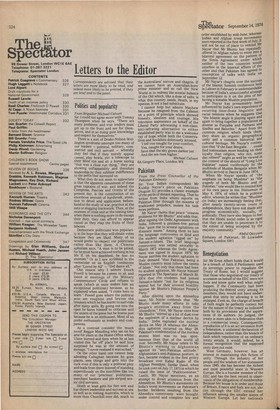Pakistan
From the Press Counsellor of the 'Pakistan Embassy Sir: Your Indian correspondent Mr Kuldip Nayar's piece on Pakistan (August 31) provides a classic example of the perils of distant reporting. That he writes from India where reports on Pakistan filter through the miasma of traditional prejudice, makes his task more perilous. Mr Nayar claims that peace "creates problems for Mr Bhutto" and adds that, after signing the Delhi Agreement with India, followed a problem-free period that "gave rise to several agitations on domestic issues." Among them he lists the language controversy in Sind and the student agitation "egged on" by Jamaat-e-Islami. The brief language controversy was settled amicably in March 1972 whereas the Delhi Agreement was signed in August 1973. Mr Nayar ascribes the student agitation to their demand "that Pakistan, being a Muslim country must follow the tenets of Islam." Not only that there had been no student agitation, Mr Nayar himself reported in The Spectator of March 30, 1974 that the students had joined Jamaat-e-Islami "not for its religious appeal but for their avowed hostility against Mr Bhutto's Pakistan People's Party." After dilating upon the Ahmediya issue, Mr Nayar contends that "Mr Bhutto made many efforts to take people's attention away from the Ahmecliyas," First, Mr Nayar cites how Mr Bhutto "stirred up a lot of dust over the explosion of a nuclear device by India." India exploded the nuclear device on May 18 whereas the Ahmediya agitation occurred on May 29. Pakistan's condemnation of the nuclear atomic blast was no less spontaneous than that of the world all over. Secondly, Mr Nayar refers to Mr Bhutto's warning to Afghanistan against its "anti-Pakistan attitude." Afghanistan's anti-Pakistan posture, in fact, became evident in the first policy broadcast over Kabul Radio of the Afghan President, Sardar Daud, when he took over on July 17, 1973 in which he raised the issue of "Pakhtoonistan." Lastly, Mr Nayar mentions, as an attempt to divert attention from the Ahmediyas, Mr Bhutto's statements on India's troop movements on Pakistan's border. Incidents resulting from the Ahmediya controversy were brought under control and complete law and order established by mid-June, whereas Indian and Afghan troop movements were reported in the first week of July. It will not be out of place to remind, Mr Nayar that Mr Bhutto has repeatedly offered to Afghan rulers to enter into a bilateral agreement on the pattern of the Simla Agreement under which neither of the two countries would interfere in the internal affairs of the other and that Pakistan has agreed to resumption of talks with India on September 12. Mr Nayar's chagrin over the success of the Islamic Summit conference held in Lahore in February is understandable because of India's unsuccessful attempt to participate in it on the plea of her having a sizeable Muslim population.
Mr Nayar has presumably been influenced by India's own experience of recurring inter-State linguistic and racial tensions when he suggests that "the Islamic angle is playing again and again to bring together a population as diverse as Punjabis and Pathans and Sindhis and Baluchis." Apart from the common religion which binds theM, they share an organic geographical unity and a common historical and cultural heritage. Mr Nayar's contention that "if the East Bengalis . . . could find nationalism more binding on their loyalty than religion, why not, some day, others?" might as well be viewed in the context of the shouts of "Long Live Pakistan" raised vociferously by the multitude of Muslim Bengalis when Mr Bhutto arrived in Dacca in June 1974.
When Mr Nayar speaks of "the emphasis on being Muslims" as "the tragedy of both Mr Bhutto and of Pakistan," one would like to remind him of his own piece in the Statesman of May 8, 1974, of which he is political editor, wherein he writes that "Muslims .(in India) are increasingly feeling that, after nearly twenty-seven years of independence, they have not made any progress economically, socially, or politically. They have also begun to feel that the Hindu social order is so rigid that they are unable to penetrate it to the extent of being accepted by the majority community."
Abdul Qayyum Embassy of Pakistan, 35 Lowndes Square, London SW1


































































 Previous page
Previous page